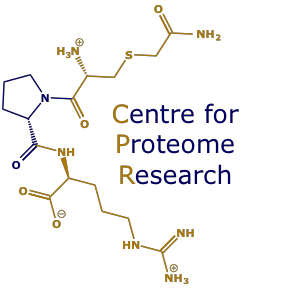Safe and collegiate working in CPR
01/03/15 09:32 Filed in: Safety | Collegiality
A few guidelines for safe and collegiate working in CPR. Read More...
Sample preflight checklist for LCMS
One of the driving principles in a lot of our work is ‘defend the instrument from the sample’! It is all too easy to cause a significant amount of LCMS downtime by a) overloading a system by not understanding the relationship between load and complexity, b) by not adopting one of our standard protocols, c) by not checking that you have complete digestion, d) by forgetting about components that persist in the workflow (e.g. detergents), e) instructing particulates and lastly, by not taking enough responsibility and care, or consideration for the person following you. This check list is meant to be a helpful guide to prevent most of the common pitfalls. Remember, if you are in any doubt, than ASK! Read More...
PFG Digestion protocol for in-solution digests
10/06/14 22:38 Filed in: Digestion
[Download PDF file]
A key step in almost any proteome analysis is the conversion of protein to (usually tryptic) peptides. This step is so critical because a) it generates analytes that are appropriately charged for MS analysis, and b) are compatible with the nanoscale chromatography systems we use. Failure to achieve complete digestion can lead to missed cleavage (which weakens the strength of database searches) and worse, led to (pre)column clogging.
We should therefore adopt a common digestion protocol that will work for most analyses. The aim is to load onto the column an appropriate amount of material such that a typical protein will be represented at approx 50fmol. In order to calculate this load, it is necessary to make some assumptions. First, that the recovery of material after all digestion/preparation protocols is 100%, secondly, the molecular weight of an ‘average’ protein for complex protein mixtures, and c) the overall complexity of the mixture. Read More...
A key step in almost any proteome analysis is the conversion of protein to (usually tryptic) peptides. This step is so critical because a) it generates analytes that are appropriately charged for MS analysis, and b) are compatible with the nanoscale chromatography systems we use. Failure to achieve complete digestion can lead to missed cleavage (which weakens the strength of database searches) and worse, led to (pre)column clogging.
We should therefore adopt a common digestion protocol that will work for most analyses. The aim is to load onto the column an appropriate amount of material such that a typical protein will be represented at approx 50fmol. In order to calculate this load, it is necessary to make some assumptions. First, that the recovery of material after all digestion/preparation protocols is 100%, secondly, the molecular weight of an ‘average’ protein for complex protein mixtures, and c) the overall complexity of the mixture. Read More...
